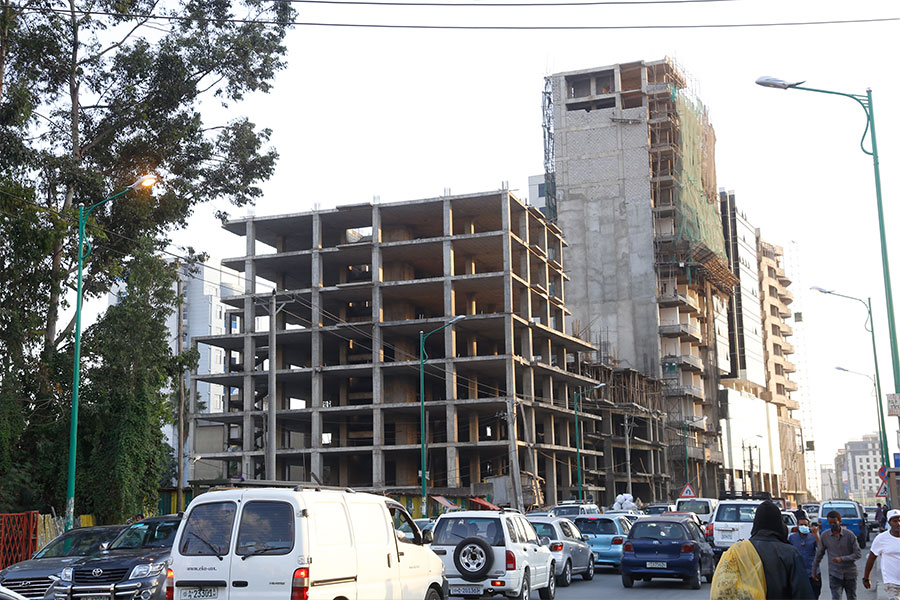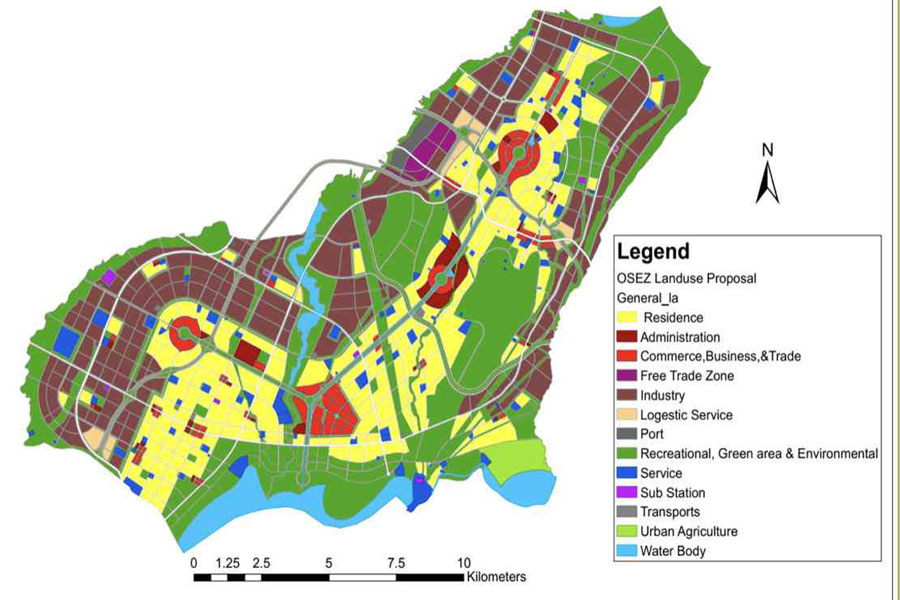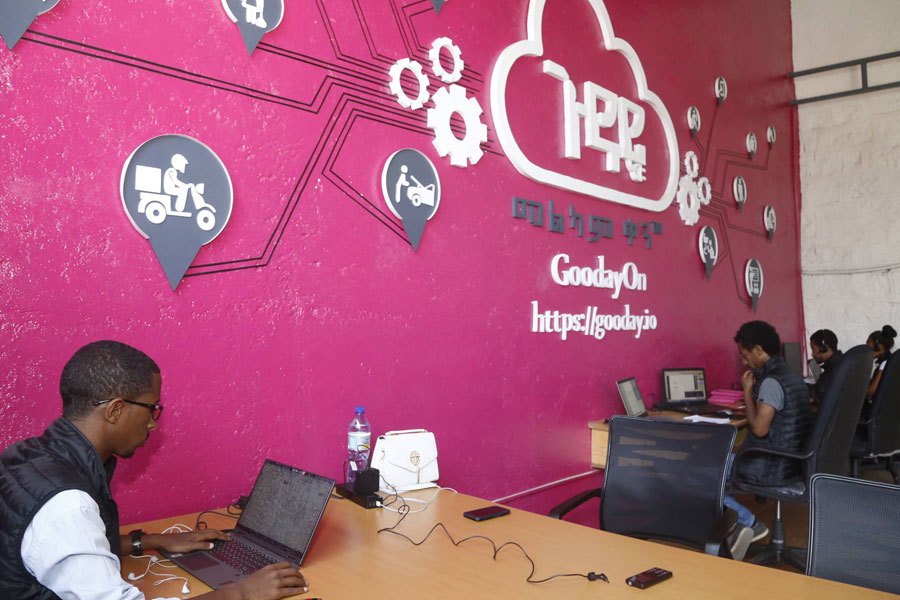
Radar | Oct 09,2021
It was a cold morning, and the temperature was below 10 degrees celsius. Drivers were wearing sleepy expressions as they whizzed by the streets of Sengatera, an area blossoming into Addis Abeba's financial district. The Wall Street of the capital in the making.
A kilometre farther, on Ras Desta Damtew Street in the same neighbourhood, dozens of youth stood nonchalantly below the towering figure of Ethiopia’s tallest building, soon to be the headquarters of the Commercial Bank of Ethiopia (CBE). They were waiting to be picked up for odd jobs by the China State Construction Engineering Corporation (CSCEC), the main contractor on the colossal project. Hoping to be hired, some of these young men and women came at the crack of dawn; others were joining the crowd.
Disappointed by the lack of interest from the contractor, a few of them could be seen leaving not long afterwards, having little choice but to come back the following morning to try their luck. The last batch of workers was picked up at 7:30am, and that was that.
Almaz Hailu was fortunate that morning; she got the job, at least for the day.
“I had to come to this place every morning for almost four months to get a job,” said Almaz before her supervisor called her to start her exhausting daily work.
It is a job that earns her 150 Br a day. Though it is no jackpot, the pay is enough to keep her from the streets for scraps, barely surviving.
Not everyone was as lucky, though. Seeking a better life and opportunities, many youth flocks to the capital every day. They have good reason to. Boasted as the construction hub of Ethiopia, Addis Abeba has always been the preferred destination for businesses, domestic or international. The construction industry has been the driving force, attracting tens of thousands, mainly from rural parts.
With Ethiopia’s wealth largely concentrated in urban areas, particularly in Addis Abeba, getting a "good-paying" job for daily labourers entails travelling hundreds of kilometres. Lately, it requires a great deal of patience, with the slowdown facing the economy and the construction industry in particular, the largest employer among all segments of the economy.
In a city where the inflationary pressure is menacing to the livelihoods of many, having a job on its own does little to cushion the alarming cost of living. Even worse is life in Addis Abeba without a job, especially when the headline inflation sits above 30pc, the highest in a decade.
Aberash Samuel grew up in an area on the outskirts of Hawassa. She came to Addis Abeba four years ago, looking for a job. It took her a few days to find work as a daily labourer for a local contractor when she arrived. Four years down the road, things have changed drastically. Jobs are nowhere to be found.
“There are almost no new construction projects," said Aberash, standing in front of the CBE's shiny new headquarters. "A few are available under Chinese contractors, which are hiring at the moment.”
Like the Chinese firm, 23,000 contractors registered to do business in the construction industry provide jobs for five percent of the national workforce of over 41 million, according to the Central Statistics Agency (CSA). Growing by an annual 11pc, this has been an industry under pressure over the past couple of years, more so since the COVID-19 outbreak two years ago. But, a major setback for an industry that was expanding at a rate higher than any other segment of the economy, the problems had long been piling up.
Half-finished buildings dot Addis Abeba's streets. Skyrocketing prices for construction inputs and restrictions enacted by government authorities and regulators at the central bank could mean these hollow buildings could remain that way for quite some time to come.
The unfolding began with the shortage of cement that surfaced in 2019; prices doubled to 500 Br a quintal. This led to price escalation on construction costs, forcing some contractors to suspend projects temporarily. A combination of factors led to the shortage in the market, from the unavailability of spare parts that prevented cement plants from operating at full capacity to the supply chain falling under the whims of intermediaries.
"That was the beginning of the crisis,” said Ewket Hailu, a major shareholder at a grade-four contractor bearing his name.
However, the shortage of cement was hardly alone in bringing the industry to its knees. Prices for reinforcement bars (rebar) tripled over the last two years, reaching 80 Br a kilogramme. It was a complete shock to the industry players.
Then came COVID-19.
The social distancing observed to curb the spread of the virus might have helped countries control infection rates, at least for a brief period. But it came with a cost and a massive bill for contractors and their clients. Parties involved in construction projects were unable to move projects forward. On-site suspensions, delays, and additional costs were evident, with some contracts terminated as a direct result. Not a few of the contractors and their clients were compelled to renegotiate contracts.
COVID-19 has not only delayed projects but also escalated the already mounted prices of construction materials, according to Addis Mideqsa, a founder and general manager of AK Construction, a grade-four contractor that has been in the industry for almost a decade. Cement and rebar might have seen prices surge as high as 50pc since the pandemic. But finishing materials fared worse, leaving contractors aghast while exacerbating the cost of construction, pushing even the government to consider price adjustments for many of the 800 ongoing public projects it pays for.
The price of aluminium, a major input for framing the glittering glass cladding the concrete frames, skyrocketed from less than 4,000 Br a square metre to over 10,000 Br. Floor and wall finishing materials saw prices double. The depreciation of the Birr against major currencies fuelled the crisis. The Dollar-value of the Birr more than doubled since 2016 to 47 Br last week, a trend alarming to businesses across the board.
“This has bankrupted us all, as none of us predicted such unforeseen circumstance while entering into contracts,” said Addis.
Titans of the industry fell one after the other. Some of the household brands in the construction industry – Afro-Tsion Construction Plc and Tekleberhan Ambaye Construction (TACON) – saw their assets seized and eventually foreclosed by the banks.
Businesses involved in equipment rental have followed in the downward spiral. Some of these companies, such as Daniel Alemu Construction Machineries Rental, which sold five heavy-duty pieces of machinery, were forced to shift to another line of business.
"The industry was competitive, but the slowdown made it an unpredictable business," said Daniel Alemu, its manager.
While external factors played a significant role in shaping the unpropitious outcomes, the latest developments in the financial sector and recent administrative measures make the situation even worse.
Contractors have been unable to access credit after the central bank's freeze in August on collateralised loans, drying up their source of working capital. The instructions from the central bank restricted commercial banks from issuing guarantee bonds to contractors, though this was later lifted.
But the decision was fateful; several project owners had to suspend their projects temporarily.
Lifting the restrictions on guarantee bonds had little impact, for regional and federal authorities have yet to resume processing asset registration for use as collateral for securing guarantee bonds.
AK Construction was one of the victims of this predicament.
The company sits on a 10 million Br electromechanical contract from one of the public universities as it was unable to get a guarantee bond from commercial banks due to the suspension of services from the Documents Authentication & Registration Agency.
“We had hoped that the government would understand how critical of a condition we're in," Addis told Fortune. "That's not happening.”
To the frustration of businesspeople like Addis, the authorities seem to double down on their restrictive measures directly bearing the construction industry. The authorities, appearing keen to lead the economy with big-stick policy approaches, have suspended all services related to land-lease. The provision of design and building permits has also been temporarily stopped, leaving many in the consulting and supervision business in the cold.
The measures came into force last month, and it has put the construction industry to a standstill.
“No one can start a new project,” says Ewket, frustrated, calling the measure an outcome of ill-advised public policy.
Policymakers have a different take on the series of decisions they have taken lately. They see the restrictions as a necessary evil and an unavoidable bargain to rescue the macroeconomy from further assault by groups they accuse of being determined to undermine the national economy.
The public face behind the recent economic reform undertakings by the federal government, Eyob Tekalign (PhD), a state minister for Finance, is one of these officials who believe the industry has a bitter pill to swallow.
"It's temporary and what the industry is facing is a slowdown," Eyob told Fortune. "It's not completely been crushed."
Neither are policymakers and industry players on the same page on what needs to be done to resuscitate an industry in an intensive care unit. Some see the crisis within the context of the global trend where domestic initiatives take time to materialise. Mesfin Negewo, director of the Construction Works Regulatory Authority, says the problem has been in the making for some time and needs patience.
"The industry has been in limbo for years," said the Director.
Patience is exactly what industry players confronted with mounting losses seem to have little of. A grade-five contractor with over two decades of experience in the industry, Amha Sime urges policymakers to consider price adjustments for projects financed by the state. Doing this as promptly as possible, he says, could spur construction activities and save the industry from the impending disaster with far-reaching consequences.
A study is underway to recommend price adjustments in the construction industry, which will impact public projects with an aggregate cost of 92 billion Br. Already endorsed by the Ministry of Finance, which directed federal government offices and public universities to adjust the contractual value of projects based on the changes in the price of construction inputs, the study is expected to assist officials in identifying contractors eligible for cost escalation adjustments.
"It's to be implemented as soon as possible before things get out of control and contractors as well as project owners incur more losses," urges Amha.
A sense of urgency is felt by people on the margins of the industry. Whether suppliers, labourers, contractors or even onlookers, the deserted skeletal frames of buildings and cranes stuck in the directions they were left idle, are reminders of the need for action.
Abebe Demisew, head of the Construction Technology & Management Academic Programme at Debre Markos Institute of Technology, has published several studies on the construction industry. He wants to see policymakers focus on reforms in the construction material market, which is under stress due to a crippling forex shortage.
"Equally important is boosting the capacity of local contractors, which requires lifting the restrictions placed by the government and providing incentives," said Abebe.
Neither pieces of his advice, providing incentives nor lifting restrictions, is likely to be heeded any time soon.
"There is no quick fix for it," said Mesfin, who leads a federal agency overseeing the registration and certification of construction projects and contractors.
The lives of almost two million people like Almaz depend on the construction industry. With new projects not coming up and the CBE's headquarters project nearing completion, expected to be inaugurated in the coming months, Almaz and many others face an uncertain future.
"I'm not sure what will happen next," she told Fortune.
The same holds true for all involved in the industry, from the largest contractors to the poor labourers who stand in the streets of Addis Abeba at the crack of dawn, hoping for a chance to make a living, if not to thrive.
PUBLISHED ON
Oct 17,2021 [ VOL
22 , NO
1121]

Radar | Oct 09,2021

Sponsored Contents | May 03,2022

Addis Fortune | May 04,2024

Agenda | Jan 16,2021

Fortune News | Dec 24,2022

Radar | Jul 11,2021

Featured | Oct 23,2021

Sponsored Contents | May 20,2021

Editorial | Oct 02,2021

My Opinion | May 21,2022

Dec 22 , 2024 . By TIZITA SHEWAFERAW
Charged with transforming colossal state-owned enterprises into modern and competitiv...

Aug 18 , 2024 . By AKSAH ITALO
Although predictable Yonas Zerihun's job in the ride-hailing service is not immune to...

Jul 28 , 2024 . By TIZITA SHEWAFERAW
Unhabitual, perhaps too many, Samuel Gebreyohannes, 38, used to occasionally enjoy a couple of beers at breakfast. However, he recently swit...

Jul 13 , 2024 . By AKSAH ITALO
Investors who rely on tractors, trucks, and field vehicles for commuting, transporting commodities, and f...

Nov 1 , 2025
The National Bank of Ethiopia (NBE) issued a statement two weeks ago that appeared to...

Oct 25 , 2025
The regulatory machinery is on overdrive. In only two years, no fewer than 35 new pro...

Oct 18 , 2025
The political establishment, notably the ruling party and its top brass, has become p...

Oct 11 , 2025
Ladislas Farago, a roving Associated Press (AP) correspondent, arrived in Ethiopia in...